- Home
- Michelle Tea
Mermaid in Chelsea Creek Page 13
Mermaid in Chelsea Creek Read online
Page 13
Sophie knocked on the door. “Nana!” she yelled. Angel had turned off the tumbler, she realized. The dump rang with quiet, and Sophie felt vulnerable, like a rabbit caught in the sight of a hawk. “Nana?” There was nothing. She nudged open the door. The place was hot. The air conditioner was off, the lights were off, the interior held a swampy humidity and a wonderful smell—like bubble gum, but sweeter and fainter. It took Sophie’s eyes a moment to adjust. “Nana?” she said, softer. The pile of sheets and pillows on the couch was only that, sheets and pillows, not the slumbering body of her grandmother. At the kitchen table covered with papers, no grandmother. The door to the narrow bathroom was open, no grandmother in there, either. Sophie walked deeper into the trailer. There wasn’t much space; the place was small but so stuffed with junk it seemed bigger for the mysteries it stored. There was a crate of antique bottles, words bulging from the glass. Another crate held glass balls, some of them caught in stiff, ropy nets. There were dishes of rusty object—nails, locks, skeleton keys. On a countertop beside a pan of old buttons sat a hot pink stargazer lily, the source of the trailer’s wonderful smell. The flowers splayed open like starfish, their petals stained rosy as tongues. Their pollen-crusted stamens dangled. The back of the trailer was so stuffed with pots bearing trees and climbing plants, succulents and ferns, it appeared to be a jungle. Sophie couldn’t spot where the trailer ended for the lush wall of foliage. How could someone so bad take care of such beautiful, natural things?
She stepped gingerly toward the greenery, dodging the chipped teacups and torn scarves littering the scratched floor. The Airstream was small but it felt so large inside, it seemed to stretch before Sophie as she moved through it, a sensation that left her a bit dizzy. She realized she hadn’t eaten enough today, or drunk enough water, and it was so hot and the work she’d done was tough. The shady coolness of Kishka’s trailer should have been a relief, but as Sophie moved toward the plants her breathing became difficult. She reached out and brushed a vine with her fingertips, peering into the plants. Something caught on the back of her throat and she choked. She needed water. She thought briefly of the sink behind her, right behind her in the trailer, but now it seemed sort of far away. This wall of plants, shimmering, creating their own environment, their own mixture of smells, was way more interesting than a glass of water. Phew. Sophie took a deep breath, and moved closer.
Were there more plants behind those plants? And more behind them? Sophie felt disoriented. Was there a mirrored back wall, presenting an infinite illusion? Sophie reached her hand to touch it, but her hand kept going. Through more plants and more plants and more. She made her breaths shallow, just little breaths, like teeny sips of air. Didn’t plants and trees help make more air? Wasn’t that what was so great about them? If Sophie looked close she could almost see the leaves making the air in front of her, the thinnest fog drifting out from the green. But was that air? Sophie tried for a regular breath and choked. She poked a bit deeper into the forest, a claustrophobic panic rising within her. Where was the wall?
As far back as she could see, Sophie caught a rustle in the leaves. A tremble, a rough shaking, a creature scampering.
“Hello?” A tiny voice quavered, and Sophie jumped, then screamed. She watched the leaves in the distance quiver as the creature dashed away, deeper into the grove, deeper and deeper, the trees trembling and twigs crackling in the quiet, deeper and deeper the thing scurried until it was gone. Somehow.
Sophie’s last breath felt like someone had taken a can of hair spray and blasted it down her throat. She pushed herself back out from the plants, shocked to see how deep she had crept into them. Pushing through rows of vines, their leaves prehistorically large, slapping her in the face, blocking her view, she ran. Her Vans slid on the undergrowth, tripped on low vines. She wanted to scream but could not take a breath to. Was the forest growing before her? Not a forest! She yelled at herself inside her freaking-out mind. No forest inside a little trailer! Finally, Sophie could spy her grandmother’s disheveled couch. With a cry she hurled herself out from the plants and onto a pile of sheets, gasping and wheezing at the cool, clean air around her. Sophie was surprised to taste the drip of salt that hit her lips, and lapped at it hungrily. She hadn’t even known she was crying.
As she caught her breath Sophie felt a tickle on the inside, someone peeking in on her. Was Angel checking in or was it something else, maybe even the plants themselves, conscious and prying? Sophie tried to make herself iron on the inside, lead, metal, wood, anything, but she could feel the tickle worming its way into her, deeper and deeper, the feeling spreading. From her seat on the sofa it just looked like a wall of plants, but the harder she looked she could see them shimmer. Sophie hopped to her feet and ran for the door, stumbling on a pile of old magazines, the pages curling in the damp heat, curling like the leaves. Outside the trailer, Sophie ate at the humid air, oblivious to the junkyard stench. She lapped at it like a great bowl of water. Ronald watched her leap down the wooden stairs, her legs as wobbly as his.
“She’s not there,” he told her. “She’s at a meeting. With the city people. She’s at the City Hall.”
“Great, thanks,” Sophie stammered. She propped herself against a tree, the rough bark somehow soothing. Her breathing became even.
“I’m not allowed in there,” Ronald said. “You allowed? She let you in there?”
“Ahhh…” Sophie shifted guiltily against the tree. “I don’t know. I was just looking for her, that’s all.”
“I can tell her you stopped by.”
Sophie wondered if Ronald had drunk slightly less today. His stance was pretty steady even without the stool, his speech slurred but quicker. Sophie was surprised to think that Ronald might actually remember to mention this visit to Kishka.
“I wish you wouldn’t,” Sophie said. “I wish you wouldn’t tell her I stopped by, okay? It was a mistake.”
Ronald nodded, no longer looking at Sophie but at the Airstream. The shine of the sky against it was such a violent flash it was like staring straight into the sun, but Ronald didn’t blink
“Fine,” he slurred, shrugging. “I won’t tell her. But you can’t surprise Kishka. She always figures it out.”
Chapter 14
Sophie waited for her mother to fall asleep in front of the television before she snuck from her house to meet Angel. The smarmy host of a nighttime talk show took the stage in his suit and tie, and Sophie stepped quietly through the flat, opening the front door with the teeniest click, flinching as she shut it with another tiny sound. None of it was as loud as the laugh track the TV barfed out, but Sophie was nervous. She didn’t really sneak out of the house, ever, and now it was two nights in a row she was acting like a juvenile delinquent.
Livia stayed behind, huddled in the shadows outside the open living room window, her orange eye on Andrea. If Sophie’s mother woke up, Livia would speed to the girl. The alibi was, Sophie was too hot to sleep in the sweltering house and was just standing out front, or taking a walk around the block. The poison ivy she’d gotten on her hands and wrists was keeping her awake and miserable, the calamine cooling it for a precious millisecond before the unbearable itch flared once more. Andrea had clucked and hissed at the sight of the angry rash, pissed at Sophie for being so foolish, playing around in the trees when she should have been working. This is what Sophie had told her, accepting her scolding with sheepish regret. But in her chest her heart pounded fearfully. It wasn’t poison ivy. It was her grandmother’s trailer greenhouse, and she had no idea why the plants had burned her skin so bad. She was anxious to get to Angel. Angel knew so much. Angel would have all the answers.
Angel lived with her mother on the second floor of a three-story house on Spencer Avenue. Sophie walked there quickly, cutting through parking lots, Giddy and Roy on her shoulders, Arthur leading the rest of the flock high above her head. She swung her arms as she walked, appreciating the coolness on her hands.
“Turn here,” Giddy said in her baby voi
ce. “Turn here. Stop. This is the place.”
A glow on the second floor seemed like candles to Sophie, sort of orange, the way the flame flickered the light. Like breath, Sophie thought. Angel was waiting on the porch. She bounded down the stairs to receive Sophie and the birds. “Hello,” she said, moving in to give Sophie a hug, then thinking better of it with the pigeons balanced on her shoulders.
“Hello,” said Giddy, and Roy gave a coo.
“Is that where you live?” Sophie asked, nodding at the flickering window above.
“Yes,” said Angel. “My mother, she’s a curandera. A witch, basically. She’s been lighting candles for you, and for the pigeons, too.”
“Oh!” Giddy exclaimed. “Please thank her for us.” Humans offered few kindnesses to the pigeons.
“Wow,” Sophie marveled, thinking it must be so cool to have a witch for a mom. “Does she know everything?”
“Yeah, she’s known of your coming. Plus, she can read emotions, like we can. She’s a snoopy mother, you know, and I live with her. She could tell something was up. I had to tell her.”
“But your shield is so strong!” Sophie was shocked. “Your mother is so powerful, she can get through it?”
“Awww, she’s my moms,” Angel said, shy. “I don’t keep that wall up with her. It would be too exhausting. The thing about the wall—” Angel’s view swept up and down the street. “Come on, let’s go in the shed if we’re going to talk about this.”
The shed was a regular wooden storage shed built under the back stairs in Angel’s yard. The yard itself was spacious, ringed with slender juniper trees. Wrapped around the shed were lush viny shrubs, shrubs tipped with white blossoms and crimson berries. She thought of Kishka’s garden and blew on her fingers. The pigeons pushed off her shoulders with a kick of their strong legs. Chicken legs, Sophie thought affectionately, watching them tuck their spindly orange limbs into their bodies as their wings pulled them to the top of the shed. No, pigeon legs.
The inside of Angel’s shed was shelved with glass candles, which Angel lit with a long kitchen lighter. There were jars of herbs marked with pieces of masking tape, Spanish words labeling the contents. Sophie’s hands and wrists throbbed. She looked at them in the bobbing glow of a candle. The skin was laced with painful welts. “Angel,” Sophie started, suddenly overwhelmed by all she had to say and learn. “Uh, my grandmother has all these plants in her trailer, and I think I’m allergic or something.” She held out her arms.
“What?” Angel shook her head like she was clearing water from her ears. She wasn’t wearing her hat, Sophie realized. That’s why Angel looked different. Her hair was pulled into a messy ponytail at the back of her skull, and her choppy bangs were flung around her face. She didn’t wear heavy boots, just some sort of plasticky sandals. She seemed relaxed, Sophie realized. She started to peek into her, was shocked to find not the leaden wall but a certain space, maybe a feeling of alarm—yes, it was alarm, the sense of alarm you have when you recognize that something has spiraled beyond your control.
With a thud the iron wall came down, giving Sophie the sensation of having been shoved. “Don’t do that.” Angel shook her head. “Not now. I’ll let you later. What are you talking about? You went into Kishka’s trailer?”
Sophie shrugged a sheepish, guilty shrug. “I just wanted to see her. After everything, you know? I know she’s bad, but she’s my grandmother. I just wanted to see if she looked different to me now. If I could see the badness.”
“You can’t,” Angel said sternly. “You can’t see badness. She just looks like any old batty lady in Chelsea who needs to quit smoking. You went into her house? Sophie, you can’t—when you’re in someone’s house, snooping like that, they can feel it. If they’re a witch or whatever.”
“Is Nana a witch?”
“I don’t know what you want to call it. She’s got mad powers. My mother has powers too, but they’re simple, good powers, that’s what a curandera is. She knows things and can heal people with herbs and her prayers. I have it, too; that’s why I’m meant to help you. We have it in my family, the powers. Look.”
Angel lifted a picture from where it leaned against a candle.
“This is my great-great-grandmother, Teresita Urrea. She had the powers, big time. She was very righteous; she helped the indigenous people in Mexico.”
“What’s indigenous?”
“The people who were there first. Like, the Native Mexicans. They were there, and then Spanish people came from Spain and messed it all up, and all the Native people, like, Indians, they were enslaved by the government. The government was so bad.”
“Like…”—Sophie searched her mind for historic examples of bad governments—“Nazis in Germany?”
“Yeah, totally.” Angel nodded. “Or, you know, America with Native Americans. The Mexican president wanted to kill all the Indians, or use them as slaves, yeah. And Teresita really felt them. She would use her healing powers to help them, she did everything for free because she’d seen God and God had told her not to like, charge for her services. So she was this amazing curandera, and she inspired the Indians to revolt, to riot, right? And there were all these battles, and they did it in Teresita’s name. She inspired them, and empowered them with her powers. She was like Joan of Arc. You know her? They teach you about her in Catholic school?”
“A little,” Sophie said. She knew Joan of Arc was French, she heard voices, she got a bunch of people to go to war and then got burned at the stake.
“Teresita’s like the Mexican Joan of Arc. She got thrown out of the country and came to America and kept healing people. She opened a clinic for poor people. Her magic was so strong it gets passed down person to person, but it gets weaker, too. My mother’s magic is weaker than her mother’s, and I am not as powerful as my mother.”
Angel looked at Sophie, nodding her head. “You are like Teresita, and like Joan of Arc, and all those girls, you know, there are so many stories. Girls who knew things and had powers and a certain destiny.” Angel smiled. “It is very, very exciting to get to know and help you, Sophie.”
Sophie felt sick from the intensity of Angel’s admiration. She didn’t really deserve it. She didn’t know anything, actually; the pigeons knew more than she did. Sophie knew nothing, was waiting for everyone to tell her everything. As for her powers, they seemed not very special in the light of birds who could speak human English and the simple existence of mermaids.
“Are you going to teach me how to read minds better?” Sophie asked.
“It’s not reading minds.” Angel laughed. “It’s reading hearts. You want to read a mind, turn on the television. That’s what the mind is—chatter, thinking. Loopy, repetitive thinking. It’s like being in a birdcage with a bunch of angry parakeets. What we’re doing is reading hearts. Most people do it a little bit every day. You know how you can feel when someone is upset, or really sad, or if someone is happy it can make you feel happy, too?”
“Yeah, totally.”
“It’s really not that magical. We can all just feel each other. It’s how people fall in love, or have friends. It’s why I can’t block myself when I’m home with my mother. I want her to feel me a little.” Angel grabbed her ponytail and tugged it tighter to her scalp. “But most people can’t get inside like we can. It’s tricky business. My mother taught me respect and caution with it. It’s like reading someone’s diary, but worse. It invades people’s privacy. But it is important. Very powerful healers can peek into a heart and take out what sickens it. I think that is what you’re meant to do, Sophie.”
Angel turned to the shelves of jars behind her. Sophie watched as she took a dark powder from one, dried green leaves from another, and another. With her own spit she made a paste, and she motioned for Sophie to giver her her hands. Angel spread the paste across Sophie’s fingers and wrists, massaged it into her palms. Sophie smelled familiar smells—coffee, and pizza, smells she could eat. “Try not to move your hands,” Angel instructed.
“They feel like they’re in casts,” Sophie said. “Or, like, papier-mâché or something.”
“Is it helping?”
Sophie was thoughtful. “More than the calamine lotion,” she said, nodding. “Yeah, I think so.”
Angel’s face had a rueful look. “This is very bad news,” she said. “This garden. I guess it is good that we know there is something strange in her trailer—but it is so bad of you to have gone there, Sophie! Your grandmother must have felt you in her home. I’m sure she knows you were snooping. Who knows what else she knows? You don’t know how to protect yourself.” Angel sighed, grabbed an indigo mussel shell from the shelf and dunked it into a dense, gritty jar of salt and honey. She smeared it over Sophie’s hands. The sting of it felt good, and the smell made Sophie’s belly rumble. She realized she hadn’t eaten dinner—she had been so anxious for her mother to fall asleep that she hadn’t joined her in a bowl of dinnertime Cheerios. She brought her mouth down to the medicine and slurped some off her skin. The taste of salt, her favorite.
“Here,” Angel said, handing her the jar and the seashell. Sophie scooped the paste out and fed it to herself, rolling her eyes in pleasure at the sweet, salty goo.
“You are very strange,” Angel observed.
“I didn’t eat dinner,” Sophie explained. She wondered about what she’d heard in the trailer, a voice, if she should tell Angel. The voice and the way she couldn’t breathe. Maybe she had imagined it? She felt too sheepish to confess more to her mentor. She figured if Angel really needed to know she could barge into her brain and find out.

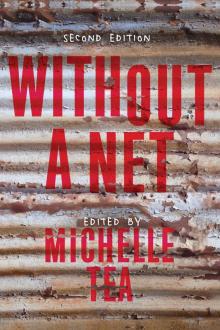 Without a Net
Without a Net Black Wave
Black Wave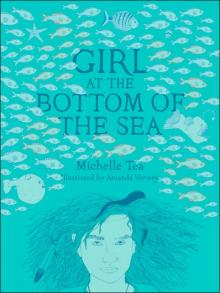 Girl at the Bottom of the Sea
Girl at the Bottom of the Sea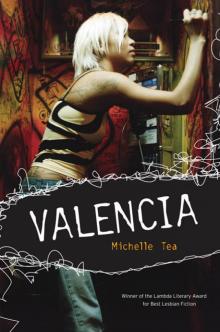 Valencia
Valencia How to Grow Up
How to Grow Up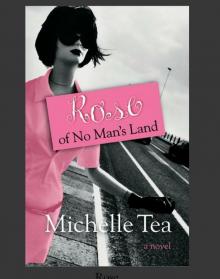 Rose of No Man's Land
Rose of No Man's Land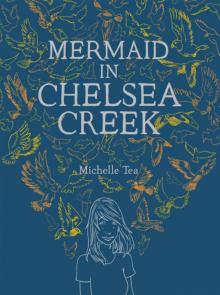 Mermaid in Chelsea Creek
Mermaid in Chelsea Creek